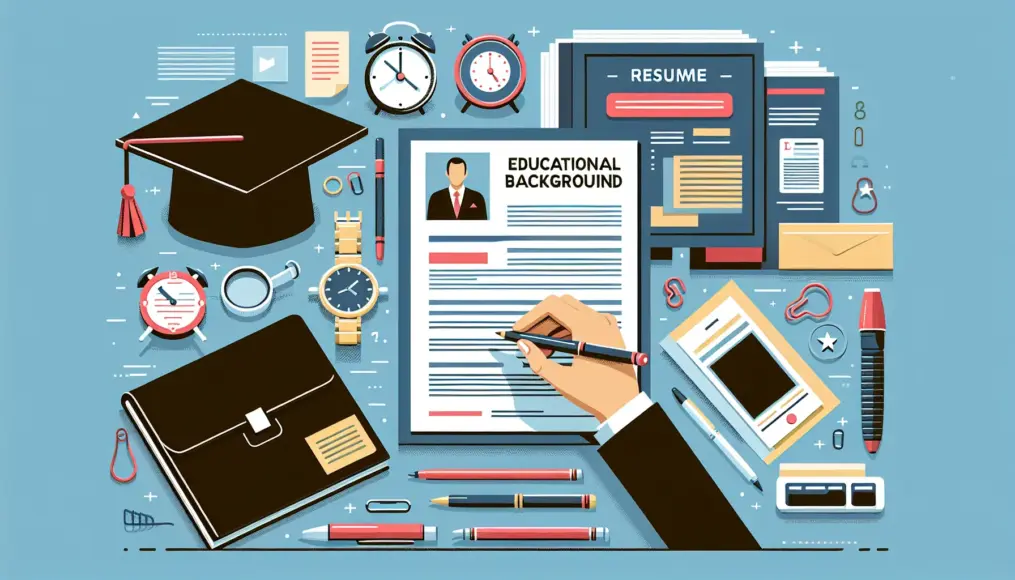When it comes to your resume, how you present your education can significantly influence the impression you make on potential employers. This is especially crucial during a job search, where the way you summarize your academic background can set you apart from the competition.
In this article, we’ll delve into effective strategies and important considerations for showcasing your education in a way that grabs attention.
Key Highlights:- The basics of formatting your education section and essential tips
- How to avoid misleading expressions and eliminate unnecessary details
- The role of your education on your resume and the pursuit of clarity and visibility
By understanding these elements, you can craft a compelling education section that enhances your overall resume and helps you stand out in the job market.
How to Effectively Write the Education Section of Your Resume
The way you present your education on your resume can significantly impact the impression you make on potential employers.
A well-documented educational background can leave a positive impression on hiring managers.
In this article, we’ll cover the basics of how to list your education and share some tips to make it stand out.
Basic Guidelines for Listing Your Education
When writing the education section of your resume, it’s crucial to adhere to some fundamental rules.
Start by accurately stating the name of the institution and your graduation date.
For instance, it’s common to write, “Graduated from XX University, Faculty of Economics.”
Don’t forget to include information about your middle and high schools as well.
By following these basic guidelines, your resume will be clearer and easier to read for recruiters.
- Accurately state the name of the institution and graduation date
- Include information about middle and high school
- Aim for a format that is easy for readers to understand
Tips for Making Your Education Stand Out
To make your education section more appealing, you’ll need to get a bit creative.
Consider highlighting your academic achievements, special projects, or certifications as key selling points.
For example, mentioning the topic of your thesis or your role in extracurricular activities can be effective.
Additionally, using numbers to demonstrate your accomplishments can add more credibility.
Incorporating this type of information will help differentiate your resume from those of other applicants.
By considering the overall balance of your resume and referring to the Guide to Highlighting Your Experience on Your Resume, you can more effectively showcase your strengths.
- Add academic achievements and special projects
- Mention your thesis topic and extracurricular activities
- Use numbers to enhance credibility
Tips for Writing Your Educational Background on Your Resume
When it comes to listing your educational background on your resume, clarity is key. It’s essential to ensure that hiring managers can easily understand your qualifications.
Additionally, omitting unnecessary information can help keep your resume looking polished and professional.
Avoiding Misunderstandings
When writing about your education, aim for clear and straightforward expressions.
For instance, using abbreviations for specific departments or majors might confuse the reader. It’s better to use the full names and provide explanations when necessary.
Also, accurately listing your graduation and enrollment years is crucial.
By using clear and precise language, you can create a resume that conveys your qualifications effectively.
- Use official names for departments and majors
- Avoid abbreviations and add explanations if needed
- Accurately list graduation and enrollment years
Omitting Unnecessary Information
It’s important to include only relevant information on your resume.
For example, adding hobbies or skills that don’t relate to your education can distract hiring managers.
Consider leaving out outdated degrees or unrelated certifications as well.
Remember, your resume is meant to convey your background succinctly, so make thoughtful choices about what to include.
By eliminating unnecessary details, you can create a more compelling resume.
- Don’t include hobbies or skills in the education section
- Omit outdated degrees or unrelated certifications
- Be selective with information to keep it concise
For more detailed guidance on crafting your resume, check out The Key to Job Change Success! Effective Resume and Work History Writing Guide.
The Role of Education on Your Resume
When it comes to your resume, education is a key element that showcases your foundational background.
This is especially true during a job search, where the interplay between your educational background and work experience becomes crucial.
In this section, we’ll discuss how to balance your education with your work history and how to leverage it as a selling point.
Balancing Education and Work Experience
The balance between your education and work experience can significantly impact the overall impression of your resume.
Generally, individuals with extensive work experience tend to keep their education section brief, while recent graduates or those early in their careers should provide more detail about their academic background.
It’s essential to consider how your work history relates to your education.
For instance, explaining how what you learned in school applies to your current job can create a more positive impression.
- Keep education concise if you have extensive work experience.
- Recent graduates should elaborate on their educational background.
- Highlight the relevance of your studies to your professional experience.
Leveraging Education as a Selling Point
Your educational background can serve as a powerful selling point.
By emphasizing your academic achievements and any special projects, you can enhance the impression you make on hiring managers.
Specifically, including any awards or relevant certifications can help distinguish you from other candidates.
Additionally, showcasing the skills and knowledge you’ve gained through your education and how they can benefit your future role is also effective.
For more insights on this topic, check out How to Write Past Job Experience on Your Resume? Tips for Success.
- Highlight academic achievements and projects.
- Include awards and relevant certifications.
- Showcase skills gained through education.
Important Tips for Writing Your Education Section on a Resume
When it comes to listing your education on a resume, there are several key considerations to keep in mind.
Choosing the right format and ensuring clarity are essential for making a positive impression.
In this section, we’ll explore specific tips for effectively presenting your educational background on your resume.
Choosing the Right Format
The format of your resume is crucial.
Typically, you’ll choose between a horizontal or vertical layout, but it’s best to select one that aligns with the company culture.
Make sure the education section is organized and easy to read, following a logical order.
For instance, it’s common to list your most recent education first, known as “reverse chronological order.”
By paying attention to format, you can make your resume look more professional.
- Choose between a horizontal or vertical format
- Aim for a style that matches the company culture
- Organize your education in reverse chronological order
Enhancing Readability
Readability is key when it comes to resumes.
Particularly for the education section, which contains a lot of information, a clean layout is necessary.
Adjust the font size and line spacing appropriately, and include margins to enhance readability.
Using bullet points can also help convey information succinctly.
By focusing on readability, you’ll create a resume that leaves a great impression on hiring managers.
- Adjust font size and line spacing
- Use margins to improve readability
- Utilize bullet points for concise information delivery
Additionally, to elevate the overall quality of your resume, consider referring to this guide on how to write a resume for hospitals! Key points for success.
Summary
When it comes to crafting your resume, how you present your education is a crucial element in the job search process.
It’s essential to organize accurate information clearly and format it properly.
Use this guide to create an appealing education section and submit your resume with confidence.
- Make sure to list your education accurately and clearly
- Pay attention to formatting and readability
- Use your education as a selling point
Create a resume that effectively communicates your experiences to ensure a successful job search!
If you have any thoughts or questions, feel free to share them in the comments.



Comment